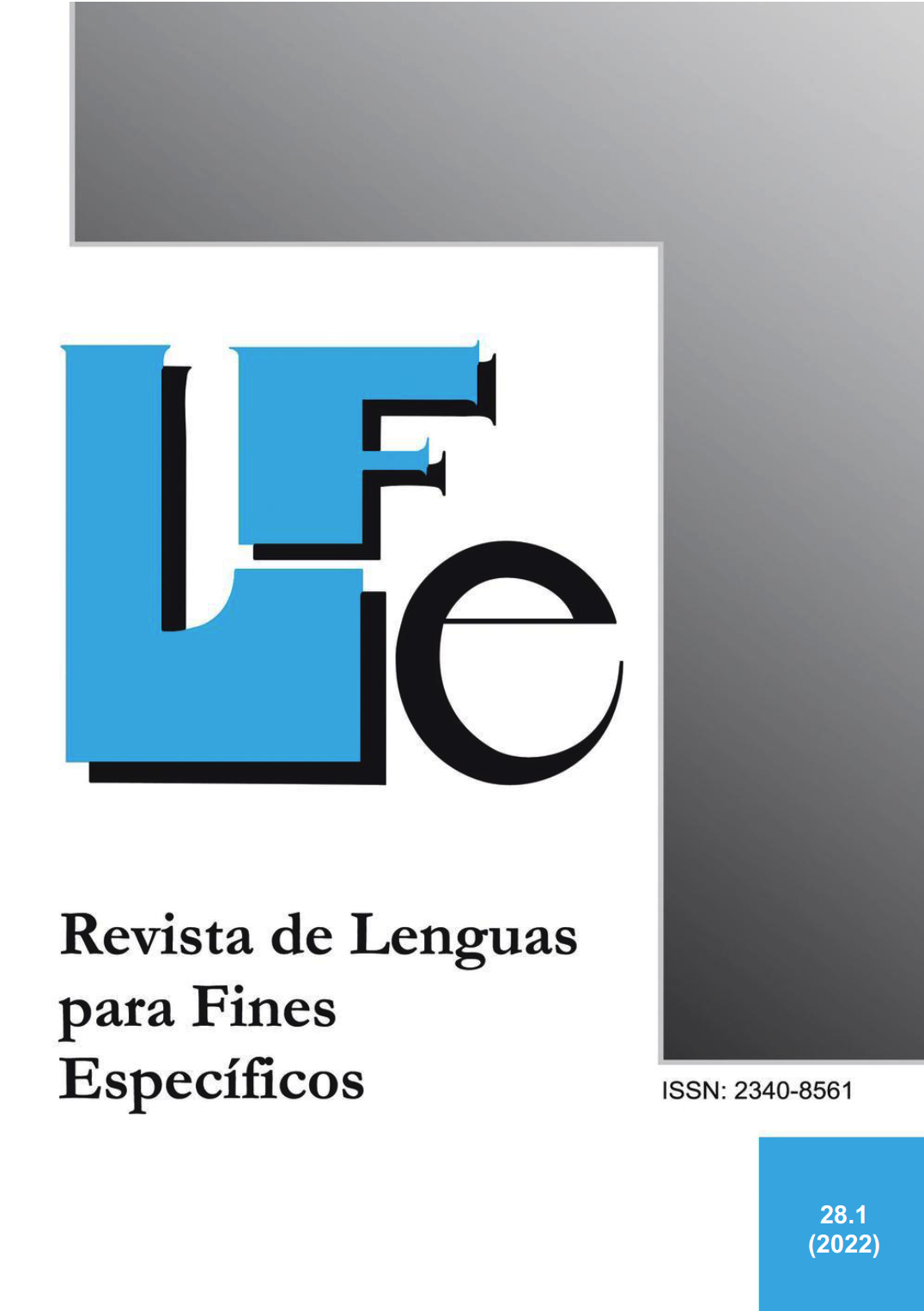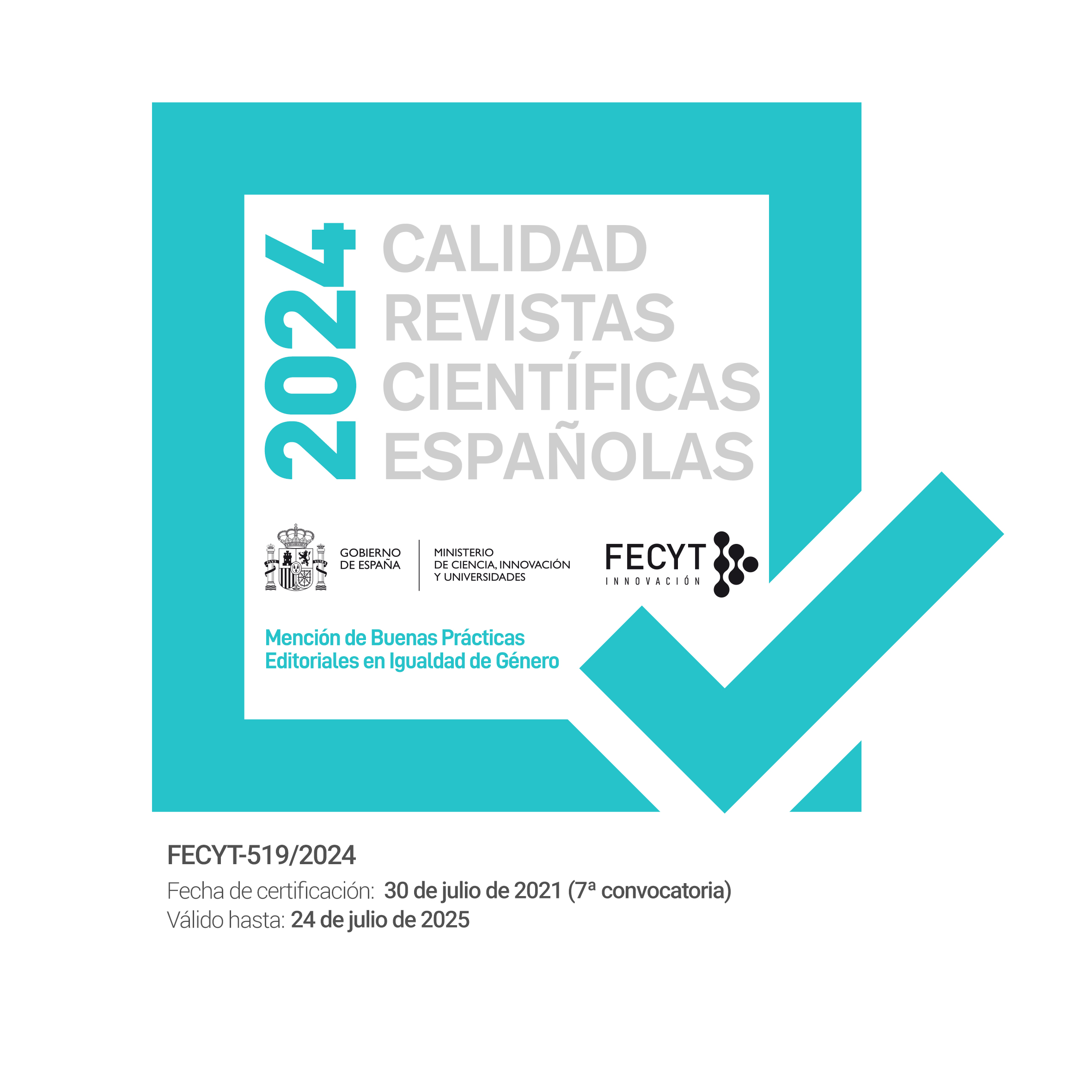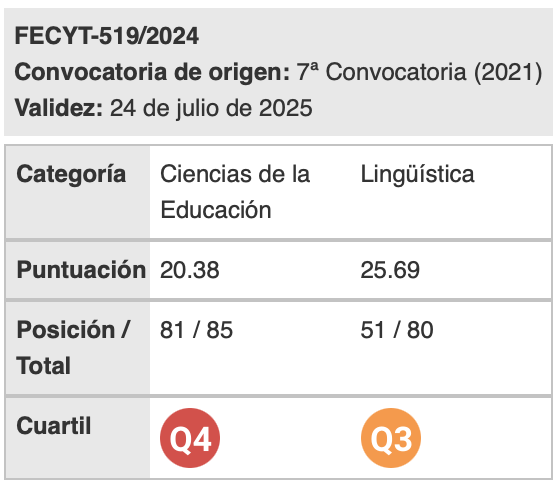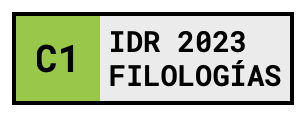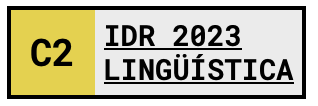Telecollaborative Projects for Teaching English for Professional and Academic Purposes
Palabras clave:
Telecolaboración, Trabajo mediante proyectos, Enseñanza de Inglés, Lengua para Fines EspecíficosResumen
El uso práctico del enfoque basado en proyectos mediante telecolaboración parece ser un recurso útil en el aula de idiomas extranjeros. Esta investigación tiene como objetivo analizar la percepción de los estudiantes sobre la necesidad de comunicarse en un ámbito global siguiendo la clasificación de las situaciones comunicativas más habituales propuesta por Lehman y DuFrene (2013). Para ello, se realizó un experimento entre estudiantes de la Universidad Politécnica de Valencia (UPV) y del Instituto Politécnico Igor Sikorsky de Kiev (KPI) durante el semestre del curso 2020/21. Estudiantes de ambas universidades trabajaron virtualmente en equipos mixtos internacionales en sus proyectos para crear blogs sobre el tema 'Sustainable development today’. Nuestros resultados mostraron que los estudiantes de ambas instituciones mejoraron su confianza para comunicarse en contextos profesionales y académicos durante la realización de este proyecto. Los participantes mejoraron su competencia comunicativa en entornos online internacionales, y esta experiencia de intercambio virtual les ayudó a desarrollar sus habilidades digitales e interculturales, entre otras. El valor de esta investigación es la implementación de un trabajo mediante un proyecto telecolaborativo en el aula de lengua extranjera con el objetivo de ayudar a los estudiantes a comunicarse en un contexto global sobre cuestiones técnicas, como la sostenibilidad.
Descargas
Citas
Alcaraz Varó, E. (2000). El inglés profesional y académico. Madrid: Alianza Editorial.
Boytcheva, S., Kalaydjiev, O., Nenkova, A., & Angelova, G. (2002). Integration of resources and components in a knowledge-based Web-environment for terminology learning. In S. A. Cerri & D. Dochev (Eds.), Artificial Intelligence: Methodology, Systems, and Applications (pp. 210-220). Heidelberg: Springer.
Brataas, G., Hughes, P., & Sølvberg, A. (1994). Integrated management of human and computer resources in task processing organizations: a conceptual view. In T. N. Mudge (Ed.) Hawaii International Conference on System Sciences (pp. 703-712). Hawaii: IEEE.
Casañ-Pitarch, R., & Candel-Mora, M. Á. (2021). Developing Language, Content, and Digital Competence through International Telecollaborative Project Work. Teaching English with Technology, 21 (1), 29-47. <https://eric.ed.gov/?id=EJ1283493> [01/02/2022].
Casañ-Pitarch, R., Candel-Mora, M. Á., Carrió-Pastor, M. L., Demydenko, O., & Tikan, I. (2020). Enhancing Language and Cross-Cultural Competence through Telecollaboration. Advanced Education, 7 (16), 78–87. <http://ae.fl.kpi.ua/article/view/214539> [01/01/2022].
Chacón, T. C. (2012). Task-based language teaching through film-oriented activities in a teacher education program in Venezuela. In A. Shehadeh & C. Coombe (Eds.), Task-based language teaching in foreign language contexts research and implementation (pp. 241–266). Philadephia: John Benjamins.
De Graaf, E., & Kolmos, A. (2003). Characteristics of problem-based learning. International Journal of Engineering Education, 19 (5), 657-662. <https://www.ijee.ie/articles/Vol19-5/IJEE1450.pdf> [01/01/2022].
Dooly, M. (2017). Telecollaboration. In C. A. Chapelle & S. Sauro (Eds.), The handbook of technology and second language teaching and learning (pp. 169-183). Hoboken: Wiley Blackwell.
Ellis, R. (2003). Task based language learning and teaching. Oxford: Oxford University Press.
Ellis, R. (2009). Task-based language teaching: Sorting out the misunderstandings. International Journal of Applied Linguistics, 19 (3), 221-246. <https://onlinelibrary.wiley.com/doi/10.1111/j.1473-4192.2009.00231.x> [01/01/2022].
Godwin-Jones, R. (2019). Telecollaboration is an approach to developing intercultural communication competence. Language Learning & Technology, 23 (3), 8–28. <https://scholarspace.manoa.hawaii.edu/bitstream/10125/44691/23_3_10125-44691.pdf> [01/01/2022].
Iwashita, N., & Li, H. F. (2012). Patterns of corrective feedback in a task-based adult EFL classroom setting in China. In A. Shehadeh & C. Coombe (Eds.), Task-based language teaching in foreign language contexts research and implementation (pp. 137–163). Amsterdam: John Benjamins.
Korkealehto, K., & Leier, V. (2021). Facebook for Engagement: Telecollaboration Between Finland and New Zealand in German Language Learning. International Journal of Computer-Assisted Language Learning and Teaching, 11 (1), 1-20. <https://www.igi-global.com/article/facebook-for-engagement/267191> [01/01/2022].
Krashen, S. D. (1985). The input hypothesis: Issues and implications. Reading: Addison-Wesley Longman.
Larsson, F. (2008). Managing the New Product Portfolio: Towards an end-to-end approach. Ph.D. Thesis. Department of Management Engineering, Technical University of Denmark.
Lehman, C. M. & Dufrene, D.D. (2013). Business Communication. Boston: Cengage Learning.
Lee, J. & Song, J. (2019). Developing intercultural competence through study abroad, telecollaboration, and on-campus language study. Language Learning & Technology, 23 (3), 178–198. <https://scholarspace.manoa.hawaii.edu/bitstream/10125/44702/1/23 _3_10125-44702.pdf> [01/01/2022].
Lenkaitis, C. A. (2020). Teacher candidate reflection: Benefits of using asynchronous computer-mediated communication-based virtual exchange. Teaching and Teacher Education, 92. <https://www.sciencedirect.com/science/article/pii/S0742051X18319607> [01/01/2022].
Lenkaitis, C. A., Calo, S., & Venegas Escobar, S. (2019). Exploring the intersection of language and culture via telecollaboration: Utilizing video conferencing for intercultural competence development. International Multilingual Research Journal, 13 (2), 102-115. <https://www.tandfonline.com/doi/abs/10.1080/19313152.2019.1570772> [01/01/2022].
Lopes, J. (2004). Introducing TBI for teaching English in Brazil: Learning how to leap the hurdles. In B. L. Leaver & J. R. Willis (Eds.), Task-based instruction in foreign language education (pp. 83– 95). Georgetown: Georgetown University Press.
Macías, C. (2004). Task-based instruction for teaching Spanish to professionals. In B. L. Leaver & J. R. Willis (Eds.), Task-based instruction in foreign language education (pp. 142–160). Georgetown: Georgetown University Press.
Marull, C., & Kumar, S. (2020). Authentic language learning through telecollaboration in online courses. TechTrends, 64 (4), 628-635. <https://eric.ed.gov/?id=EJ1257770> [01/01/2022].
McDonough, K., & Chaikitmongkol, W. P. (2007). Teachers’ and learners’ reactions to a task-based EFL course in Thailand. TESOL Quarterly, 41 (1), 107–132. <https://onlinelibrary.wiley.com/doi/abs/10.1002/j.1545-7249.2007.tb00042.x> [01/01/2022].
Muñoz, C. (2007). CLIL: Some thoughts on its psycholinguistic principles. Revista española de lingüística aplicada, 7 (1), 17-26. <https://hispadoc.es/descarga/articulo/2575488.pdf> [01/01/2022].
Nunan, D. (2004). Task-based Language Teaching. Cambridge: Cambridge University Press.
O'Dowd, R. (2015). The competencies of the telecollaborative teacher. The Language Learning Journal, 43 (2), 194-207. <https://www.tandfonline.com/doi/abs/10.1080/09571736.2013.853374> [01/01/2022].
O'Dowd, R. (2018). From telecollaboration to virtual exchange: State-of-the-art and the role of UNICollaboration in moving forward. Journal of Virtual Exchange, 1 (1), 1-23. <https://journal.unicollaboration.org/article/view/35567> [01/01/2022].
O’Rourke, B. (2007). Models of telecollaboration (1): eTandem. In R. O'Dowd (Ed.), Online intercultural exchange (pp. 41-61). Clevedon: Multilingual Matters.
Paulston, C.B. (1970). Structural pattern drills: A classification. Foreign Language Annals, 4 (2), 187-193. <https://onlinelibrary.wiley.com/doi/abs/10.1111/j.1944-9720.1970.tb02033.x> [01/01/2022].
Park, M. (2012). Implementing computer-assisted task-based language teaching in the Korean secondary EFL context. In A. Shehadeh & C. Coombe (Eds.), Task-based language teaching in foreign language contexts research and implementation (pp. 215–241). Amsterdam: John Benjamins.
Polyakova, O., & Pastor-García, B. (2021). From On-site to Online Class: The Role of Mediation in Online Teaching Simulation. Journal of Language and Education, 7 (4), 172-182. <https://jle.hse.ru/article/view/11678> [01/01/2022].
Richards, J. C., & Renandya, W. A. (2002). Methodology in language teaching: An anthology of current practice. Cambridge: Cambridge University Press.
Samuda, V., & Bygate, M. (2008). Tasks in second language learning. London: Palgrave Macmillan.
Skehan, P. (1996). A framework for the implementation of task-based instruction. Applied Linguistics, 17 (1), 38- 62. <https://academic.oup.com/applij/article-abstract/17/1/38/159436> [01/01/2022].
Stern, H. H. (1983). Language teacher education: an approach to the issues and a framework for discussion. In J.E Alatis, H.H. Stern, & P. Strevens (Eds.), Applied linguistics and the preparation of second language teachers: toward a rationale (pp. 158–64). Georgetown: Georgetown University Press.
Swain, M. (1995). Three functions of output in second language learning. In G. Cook and G.B. Seidlhofer (Eds.), Principles and practice in applied linguistics: Studies in honor of HG Widdowson (pp. 125-144). Oxford: Oxford University Press.
Swain, M. (2005). The output hypothesis: Theory and research. In E. Hinkel (Ed.), Handbook of research in second language teaching and learning (pp. 495-508). London: Routledge.
Taskiran, A. (2019). Telecollaboration: Fostering foreign language learning at a distance. European Journal of Open, Distance and E-Learning, 22 (2), 87-97. <https://doi.org/10.2478/eurodl-2019-0012> [01/01/2022].
Tinker Sachs, G. (2007). The challenges of adopting and adapting task-based cooperative teaching and learning in an EFL context. In K. Van den Branden, K. Van Gorp, & M. Verhelst (Eds.), Tasks in action: Task-based language education from a classroom-based perspective (pp. 235– 264). Cambridge: Cambridge University Press.
Tsai, N. W. (2016). Assessment of students’ learning behavior and academic misconduct in a student-pulled online learning and student-governed testing environment: A case study. Journal of Education for Business, 91 (7), 387-392. <https://www.tandfonline.com/ doi/abs/10.1080/08832323.2016.1238808> [01/01/2022].
Üzüm, B., Akayoglu, S., & Yazan, B. (2020). Using telecollaboration to promote intercultural competence in teacher training classrooms in Turkey and the USA. ReCALL, 32 (2), 162-177. <https://doi.org/10.1017/S0958344019000235> [01/01/2022].
Winch, C. (2013). Three Different Conceptions of Know-How and their Relevance to Professional and Vocational Education. Journal of Philosophy of Education, 47 (2), 281–298. <https://onlinelibrary.wiley.com/doi/10.1111/1467-9752.12025> [01/01/2022].
Descargas
Publicado
Cómo citar
Número
Sección
Licencia
Aquellos autores/as que tengan publicaciones con esta revista, aceptan los términos siguientes:
- Los autores/as conservarán sus derechos de autor y garantizarán a la revista el derecho de primera publicación de su obra, el cuál estará simultáneamente sujeto a la Licencia de reconocimiento de Creative Commons que permite a terceros compartir la obra siempre que se indique su autor y su primera publicación esta revista.
- Los autores/as podrán adoptar otros acuerdos de licencia no exclusiva de distribución de la versión de la obra publicada (p. ej.: depositarla en un archivo telemático institucional o publicarla en un volumen monográfico) siempre que se indique la publicación inicial en esta revista.
- Se permite y recomienda a los autores/as difundir su obra a través de Internet (p. ej.: en archivos telemáticos institucionales o en su página web) antes y durante el proceso de envío, lo cual puede producir intercambios interesantes y aumentar las citas de la obra publicada. (Véase El efecto del acceso abierto).

Revista de Lenguas para fines específicos is licensed under a Creative Commons Reconocimiento-NoComercial-SinObraDerivada 4.0 Internacional License.

